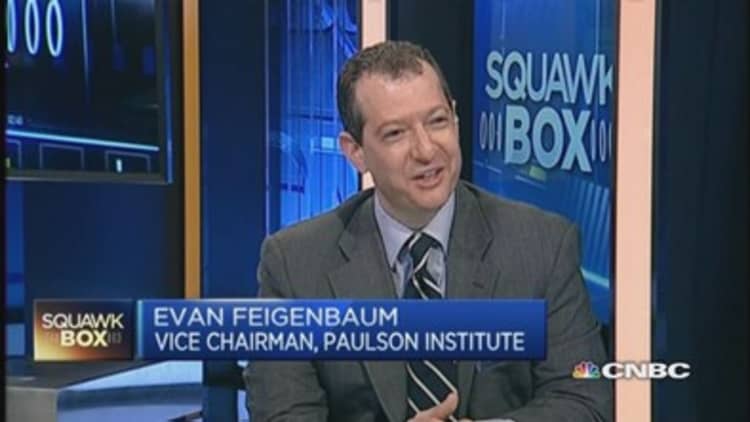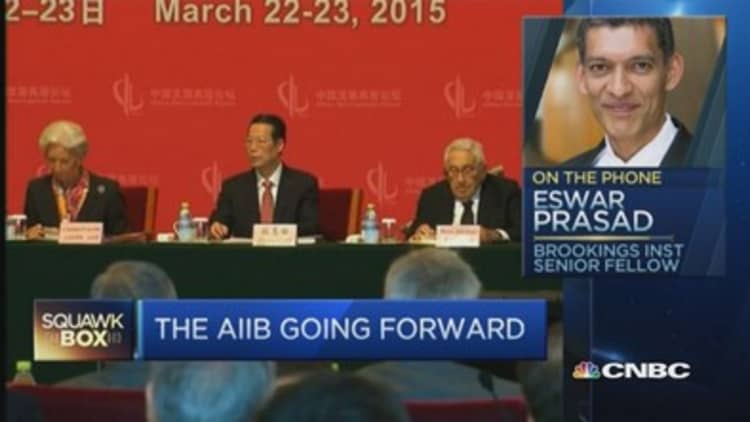Japan is likely to join the Asian Infrastructure Investment Bank within a few months, according to the country's ambassador to Beijing, a move that would see Tokyo break ranks with Washington and leave the US as the only big holdout.
Masato Kitera told the Financial Times he agreed with Japanese business leaders' belief that the country would sign up to the China-led development bank by June.
"The business community woke up late, but now they have mounted a big campaign for the AIIB which appears to be very effective," Mr Kitera said.
The $50 billion AIIB has proved a flashpoint for international alliances, with Washington increasingly rattled as traditional allies — starting with the UK and including South Korea and Australia in recent days — break ranks.

A Japanese move to join the bank would be a reversal of rhetoric and, for China, the biggest coup yet given the fractious relationship between the two Asian powers. Japan also has strong links to the rival Asian Development Bank, the head of which it traditionally appoints, and has in the past questioned the need for a new bank.
Barely two weeks ago, the cabinet secretary rowed back on more positive comments from Taro Aso, the finance minister.
"We are cautious about joining," said Yoshihide Suga, chief cabinet secretary. "Minister Aso's position is the same."
Read MoreMore countries say to join China-backed AIIB investment bank
The China-led development bank dominated discussions at the annual conference of China's Boao Forum over recent days and has become a gauge both of China's growing clout in international economic and financial matters and the corresponding decline of US influence.
Representatives of virtually every country in attendance at Boao also pledged support for the institution.
Japan would have to weigh up various factors before making a decision to break with the US on the issue, not least the finalization of the Trans-Pacific Partnership, one of the biggest trade deals in history, and a visit by Mr Abe to Washington next month.

China's rise confounds a splintered west
British opportunism met with US fumbling and discussion was technical, not strategic.
No country was seen to be as supportive of the US position as Japan — in part because many officials in both countries saw the AIIB as a direct challenge to the Japanese-controlled Asian Development Bank.
But Japanese executives look on China's ambitious plans to help build infrastructure in the region as a huge business opportunity, as well as a chance to help repair frayed relations.
Read more from the Financial Times
Read MoreJay-Z enlists top acts to promote new streaming service
Read MoreThe great American disconnect
Read MoreArgentina in last-ditch manoeuvre to pay bondholders
This month, for example, a group of Mitsubishi Group executives based in China met Jin Liqun, who will run the infrastructure bank, to offer their support. Mr Jin, once a senior official at the ADB, is a familiar face to many Japanese. They say they have confidence, in part because of his participation, that the bank will adhere to best practice.
Neither the ADB nor other multilateral financial institutions have anything like the resources necessary to finance Asia's infrastructure needs. And beyond Japan, the region lacks private sector institutions such as insurers with deep enough pockets to fund such large, long-term projects, while new capital requirements discourage banks from doing so.
The AIIB, as well as the New Development Bank (better known as the "Brics bank") and the "one belt, one road" initiative, is also seen as a way for China to deal with its huge excess capacity in industries ranging from cement and glass to iron and steel.
One former US official at Boao said that if the Japanese joined the AIIB, Washington would be forced to soften its stance and might choose to adopt observer status.
So far, US officials have said they merely want to ensure the bank adopts best practice and transparency in its lending.
Some officials in India, for example, privately say that they fear the projects will cause deepening problems for them as China attempts to export its deflation. But such voices are a minority in Asia.

